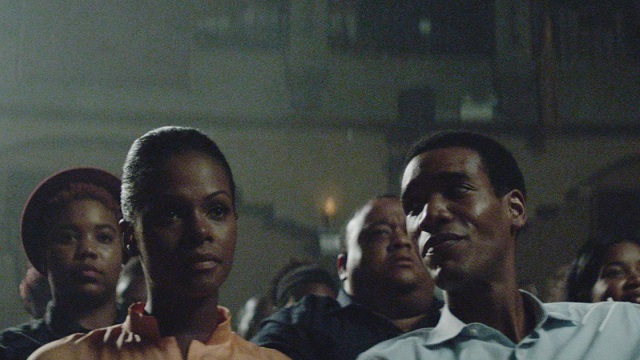Outgoing American President Barack Obama is a natural subject of adulation. With enough charisma to entrance the nation, Barack Obama rose through the ranks from a community leader in South Chicago to become American’s first Black president. A key part of his all-American image is having an intelligent and equally charismatic wife, Michelle Obama, and two growing daughters. To many observers, Barack and Michelle formed another power couple in the vein of Bill and Hillary Clinton, only without a whole slew of extra-marital sex scandals following them around.
It’s only natural that such an important part of modern American politics would be the subject of fan fiction; American citizens idolizing their leaders by crafting works of adoration with the best of intents even if the creations are of negligible quality. Southside With You is cinematic fan fiction that imagines an ideal first date between the slightly more mature Michelle and the enthusiastic Barack using a mixture of broad biographical information and thin-air concoction. Did I mention that this piece of fiction about a black couple in the south side of Chicago is the first movie written and directed by Richard Tanne, a white dude from a middle class suburb in New Jersey? Yeah, that sums up this movie.
Southside With You introduces Barack and Michelle through broad characteristics seemingly gleaned from a handful of interviews. Young Barack is perpetually late, and so poor that the floor in his car has been rusted through. Young Michelle is his mentor at the law firm he interns at. She is so uptight about agreeing to this outing she repeatedly insists that it isn’t a date. She firmly explains to Barack the audience that being black in a white law firm makes life difficult for her because it creates an addition set of expectations on top of her being a woman in a man’s world, which is tough enough. Herein lies a major problem with the movie. Instead of Barack and Michelle talking to each other about issues with the knowledge that they have a shared culture, they lecture each other on racial and poverty issues in generic details meant to spoon feed a basic understanding to a presumed white and uninformed audience. It frequently feels like the type of lecturing college freshmen engage in when they come home for Thanksgiving, newly alive with the new realization that there’s a world outside of their suburban bubble.
In the vein of Richard Linklater’s Before series, Tanne follows Barack and Michelle as they walk or drive around to various events. Tanne’s script gives the couple little things to do as they ponder their political and cultural issues with all of the depth of a white suburban male. They first go to an art exhibit featuring Ernie Barnes, which devolves into a conversation about Good Times, a show that white audiences can possibly recognize and may have watched. They go to a fictional community meeting where the impassioned speech given by Barack is chopped to shreds by choruses of agreement sounding like we were in a Baptist church. Later, they see Do the Right Thing, where Barack explains the ending to his white bosses, but then conspiratorially confesses a different interpretation to Michelle. Throughout it all, Barack pesters Michelle to confirm whether their outing has become a date yet, refusing to take No for an answer.
Exacerbating these flaws is Tika Sumpter’s central performance as Michelle Obama. Her affected pitch and accent brings her performance closer to an imitation of DJ Tanner from Full House than Michelle Robinson’s educated diction. Sumpter possesses little of Michelle’s self-possession and charisma, feeling more like a bad imitation than an actual character. This failure becomes exaggerated next to Parker Sawyers’ very capable Barack Obama, coming far closer to creating a coherent character that at least approaches Barack’s timbre and swagger.
But, the real failure is Richard Tanne whose direction is pedestrian at best. The visuals are flat, the performances have very little arc, and the editing is crude. His south side of Chicago has little actual feeling of South Chicago, and feels more like SlightlyPoorTown USA. Tanne’s script panders to the worst tendencies of the liberal left, possessing little local flavor, little understanding of the characters, and feeling more like a rote explanation of black identity than an exploration of it. Barack and Michelle feel less like fleshed out human beings than creations made to illustrate Tanne’s worldliness.
Releasing Southside With You in August of the election season feels just as cynically calculated as the rest of the movie. This is less a legitimate film than a commercial for our outgoing President and a celebration of the white power structure within the Democratic Party. It has little more nuance than the lengthy biographical base-rallying commercials that aired at either party’s conventions. I wouldn’t have been shocked if Tanne had ended his movie with #ImWithHer. The Obama’s deserve better.

